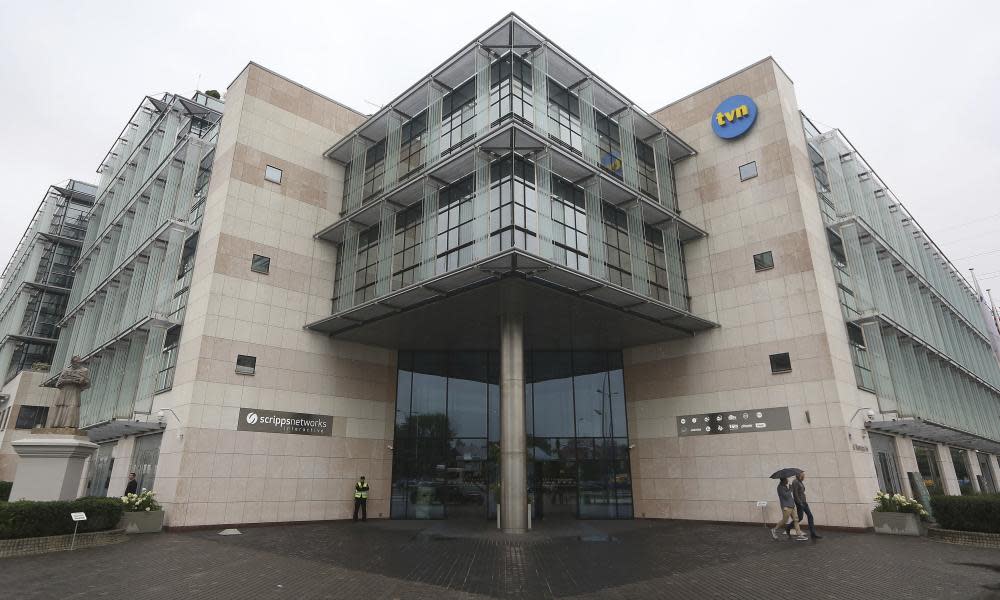Polish regulator fines US-owned broadcaster over protests coverage

Poland’s media regulator has fined a private broadcaster almost 1.5m złoty (£310,000) for news coverage of anti-government protests outside parliament, on the basis that it “propagated illegal activities and encouraged behaviour threatening security”.
US-owned TVN SA said it would appeal against the decision and defended the way in which TVN24, its news channel, covered demonstrations last December over government proposals to restrict media access to parliament.
The fine has heightened concerns about the Polish government’s assault on media. Since the rightwing Law and Justice (PiS) party assumed office in late 2015, the country has fallen precipitously in the Reporters Without Borders annual World Press Freedom Index from 18th out of 180 countries that year to 54th in 2017.
Observers say journalistic standards have deteriorated sharply in state media outlets since the government took direct control of them in early 2016.
In January, state television broadcast a documentary about the protests entitled Putsch, drawing parallels with the Maidan protests in Ukraine and informing viewers that the protests were an attempt at “regime change through riots, the revolt of the security apparatus, pressure from abroad and the media, and the paralysis of parliament and the government”.
TVN24 said the fine was based on an “extremely biased and careless report” in which “fragments of the program broadcast were described, apparently based on a predetermined thesis”.
“In the report which the national broadcasting council has cited, there is no indication of any distortion or factual error,” the news channel said.
“[It] does not take into account, for example, the fact that TVN24 broadly reported and broadcast statements of Law and Justice politicians, representatives of parliament, the PiS parliamentary club and the Polish government.”
The report was prepared by Hanna Karp, an associate of the controversial priest and religious broadcaster Father Tadeusz Rydzyk, who has close ties with the PiS. The head of the national broadcasting council, appointed by parliament last year, is a former PiS local councillor.
In comments reported in the Polish press, Karp, a contributor to the magazine Exorcist Monthly, said TVN had been fined for “calling almost directly for the collapse of the legal order of the state” by broadcasting images of the protests without commentary, seemingly implying that the broadcaster was being punished for failing to explicitly condemn the demonstrations.
Adam Pieczyński, the head of TVN24’s news division, said: “Presentation of facts, lawful or unlawful, cannot be treated as a way of encouraging any action, just as showing the course and effects of a traffic accident is not propagating violations of traffic safety rules.”
In contrast, state television described protests in July against government changes to the justice system as a “street revolt” designed to “bring Islamic immigrants to Poland” and the protesters as “defenders of paedophiles and alimony-dodgers”.
In a report on two controversial bills giving PiS the power to appoint judges and dismiss members of the supreme court, state TV’s flagship news programme ran a headline saying: “The opposition doesn’t want reforms that are good for Poles.”
Senior ruling party figures routinely portray opposition to the government as a threat to the Polish state, implying that protests are being orchestrated by foreign powers.
Speaking about the July protests, Witold Waszczykowski, the minister of foreign affairs, said: “Some European powers did not accept the result of the elections, they don’t accept this government and its direction of change. Perhaps it will end in terrorist actions against the Polish state.”
In July, military prosecutors answerable to the justice ministry brought charges against Tomasz Piątek, a journalist who published a book alleging ties between the defence minister, Antoni Macierewicz, and individuals close to Russian intelligence services and criminal organisations.
Piątek has been charged with “using force or threats against a public official” and “public insults or humiliation of a constitutional body”. He faces up to three years in prison if convicted.
The government is planning legislation that could reduce the maximum stake a foreign company can hold in a Polish media outlet from 40% to as low as 15%.
Foreign companies enjoy a strong position in the Polish media market. Ruling party politicians argue that having Polish media outlets in foreign hands lead them to serve the interests of foreign countries rather than those of Poland, claiming that under the government’s plans, Poland’s arrangements would be no different to similar restrictions in France and Germany.
The deputy culture minister Paweł Lewandowski said: “[The media] is a type of state power, an authority over opinion and a filter that communicates some views and not others. It is very influential because it can change social moods. We must have 100% certainty that everything that happens in Poland is overseen by the Polish authorities.”

 Yahoo News
Yahoo News 
